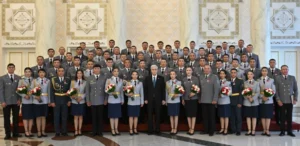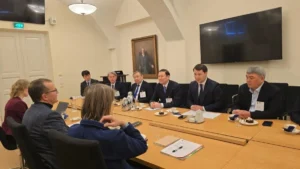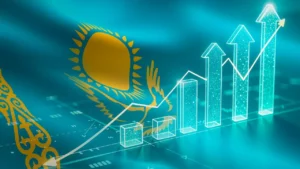USAID hosts 12th Annual Central Asia Trade Forum in Kazakhstan

USAID hosts 12th Annual Central Asia Trade Forum in Kazakhstan.
Tashkent, The Gulf Observer: Today, the United States Agency for International Development (USAID) is hosting the 12th annual Central Asia Trade Forum on the theme “Digitalization of Customs Services Towards Paperless Trade” in Astana, Kazakhstan. It is the premier international two-day event to promote connectivity and trade.
The Forum brought together representatives of the customs administrations of Central Asia to discuss ongoing work on the development of digital solutions and services, the introduction of advanced technologies (such as the use of big data, telematics and cloud services), improving operational efficiency and rethinking the way customs services work. More than 200 representatives of the customs administrations of Central Asia, Azerbaijan, Georgia, Korea, Latvia and the United States came together to explore a wide range of advanced digital tools and technologies.
Laura Chizmo, Director of the Economic Development Department of the USAID Regional Mission in Central Asia, noted that: “This trade forum has been held annually since 2011. Thus, the forum continues the tradition of cooperation between the United States and the countries of Central Asia, which began in the 20th century.”
The USAID Central Asia Trade Program is hosting the Central Asia Trade Forum in partnership with the State Revenue Committee of the Ministry of Finance of the Republic of Kazakhstan, the State Customs Service under the Ministry of Finance of the Kyrgyz Republic, the Customs Service under the Government of the Republic of Tajikistan, the State Customs Committee of the Republic of Uzbekistan, and Deutsche Gesellschaft für Internationale Zusammenarbeit (GIZ) GmbH, as well as media representing Astana Times, Business World magazine, Kazakhstan Press Club, Kapital.kz, Profit.kz and Trans Logistics.
Participants discussed the customs digital reform agenda: recent innovations and the role of digital enforcement; accelerating digitalization to enhance transit capacity and trade facilitation; Trans-Caspian international transport route; international transit systems; regional cooperation through national trade facilitation committees, anti-corruption measures that can improve customs policy and implementation, as well as increase the collection of duties and taxes and the exchange of advance information.
Central Asia has undergone great changes. In the last five years alone, the volume of intra-regional trade has doubled. Trade of the Central Asian countries with the outside world is also growing dynamically. In five years, trade has increased by 54% and now stands at US$167 billion. Trade is now the main driver of economic growth throughout the region.
Over the past decade, through this landmark forum, USAID has brought together more than 10,000 participants from over 42 countries to work together to improve connectivity, increase competitiveness, and expand trade for accelerated economic recovery and resilience in Central Asia.


